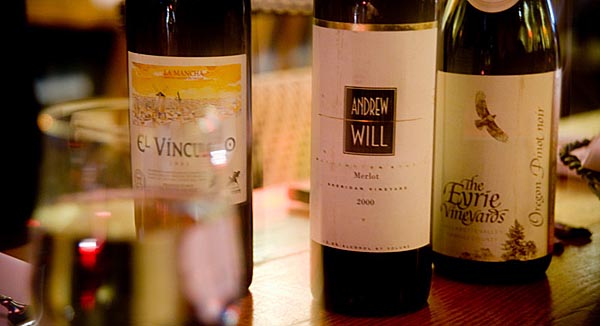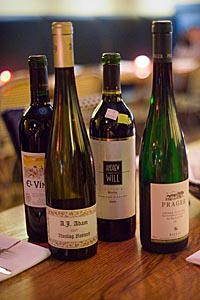
If we are defined by where we work, then it’s fitting that Annette Peters is employed by local importer and distributor World Class Wines. For nearly 30 years, the firecracker redhead has studied, traveled, and hustled to literally bring Minnesota the fruits of her labors.
Peters has been in the wine business since co-founding The Wine Company in 1985, where she spent 50 percent of her time abroad (“I had a home here, but rarely slept in it,” she says) and polished her acumen by training and tasting with some of the most respected names in the craft. As Import Director for World Class since 2006, she continues to explore cellars of the globe with about four overseas trips per year, ventures that equip Twin Cities restaurants and wine shops with bottles that are rare and unusual by any standard.
“As our portfolio manager, I manage what the company works with in terms of imports, influencing what we take on and decide to sell,” Peters explains during a Minneapolis happy hour on a recent winter eve, a few weeks before a work trip to France. “I also do the marketing, create the information and a lot of the selling tools. I educate our staff, talk to the customers. And because of the size of our company, that doesn’t excuse me from lugging wine into accounts, either. I’m still on the street. Some of the job is visionary; some of it’s practical.”
To date, Peters and World Class work with every wine-producing nation except South Africa, including 50 producers in Italy alone. Peters’ portfolio offers approximately 2,000 different wines (all vintages considered) from 300 producers. And it’s likely that you’ve sampled at least one: 500 restaurants and wine and liquor shops throughout Minnesota and in parts of Wisconsin carry Peters’ wines. Peters estimates that nearly 20 percent of her foreign wines were acquired after an in-person, on-site tasting — the number takes on a greater significance when you consider that her imports focus on smaller, non-corporate producers.
“I really don’t allow our salespeople to call our wines ‘product.’ One of the things that we do that takes wine away from being a ‘product’ is we tend to work with small family producers,” she explains. “Marketing people make ‘product.’ And we like working with farmers.

“I get a lot of calls from restaurant people saying, ‘Can you guarantee this wine is organic? It’s not certified,’ Peters continues. “And I tell them that I can guarantee it because I know the farmer. If a chef wants to know where his produce comes from — he gets to know the farmer. He doesn’t wait for it to be certified.”
Yet while working with small family producers brings a degree of rarity to the pages of Peters’ portfolio, it also complicates product handling.
“There are mercenaries out there who just want to sell wine. But for the family growers, their life and their children’s lives depend on what I do with the wine, so they want to make sure it’s responsibly managed. They don’t want their image destroyed. They want it to be in the right hands. And who could blame them? They have generations before them that have trusted someone, and many of them have been mismanaged.”

While Peters occasionally works with a trusted wine agent or buyer, she namely relies on her own research and / or travel to bring the best products to the Twin Cities.
“What it boils down to is tasting,” she says. “You’ve got to taste the stuff before you buy it. You can read everything, you can take suggestions from other people — but you really can’t know unless you taste it. And when buying wine from a winery, I’ve got to know how it’s managed, how it’s bottled. I can taste something out of a barrel, and it might taste just fine. But they can totally screw it up in the bottling. Or, I can taste something at one time of the year that comes from a certain bottling, but then I might get shipped something else that comes from a third or fourth bottling and it can be a whole different wine. Being a buyer at this level is different than being a buyer for a restaurant — there’s some chemistry involved, some geography, and understanding of how wine is made.”
Such knowledge of place, soil, winemaker, and language (Peters speaks Spanish, French, and “survival-level” Italian) helps Peters deliver wines that are easy on the pocketbook and enjoyable to imbibe. “We’re able to deliver a lot of value to the customer that way,” she says. “When dealing directly with the source, there’s no middle man or importer involved. So, maybe a wine will ended up costing you $15. But what I try to do is deliver wine that tastes like it’s $25.”
Although Peters’ gig does hold the allure of travel and the glamor of tasting unique wines in idyllic settings — it is indeed a job. She spends more time driving at night locating the vineyards of family-owned farmers than laughing on a veranda with handsome French winemakers. She spends countless hours prepping prior to a trip (making appointments, consulting maps, and so forth) and ensuring that her body is ready for the journey.
“If I’m tasting wine all day — say I’m drinking high-acid whites, in a cellar, in the winter. The wines are cold and stirring in acidity. You can burn your mouth out. You need to be physically prepared. I talk to my dentist about what I’m going to do with all this acid in my mouth everyday. It wears the enamel out, so I have special mouth rinses. And you better not have acid reflux — if you do, you’re in trouble.”
But in what can prove a highly competitive world of importing, Peters has at times put herself in trouble’s path:
“Some years ago I was in France to see this producer of Burgundy,” Peters recalls. “And a very notable US importer was also going to be there. I called for an appointment and the winemaker said he had so-and-so time open, but on this morning. And I thought, ‘This importer is going to buy him out. I’ve got to get there before this other guy or there’s not going to be any wine.’ And I had the flu. But I drove myself out to the tasting and apologized to the producer that I wasn’t feeling too well. I did the tasting and had to excuse myself from the cellar and go behind some stone wall and puke. Then I went back in and finished the tasting. Every year after that I went back to see this guy he asked me if I was going to throw up. But it was a good thing I was able to get there, as we were able to buy their wines — sometimes it’s that important.”
It’s also important that the importer balance emotional currency with sound business sense. Peters explains:
“I’m not a very emotional taster. I’m scientific. I’m not going to discern whether it’s a raspberry or a blackberry. I want to make sure there’s no brettanomyces… stuff like that. I know just enough about chemistry to get myself in trouble.
“There can be the too-emotional side for some, when people aren’t critical enough of a wine and get caught up in the place and their stay,” she continues. “Or, I’ve seen it happen where there’s a really, really hot-chick wine maker where some of the worst wine buying decisions get made. And it can happen both ways. There can be a very charming, suave, debonair wine maker and all the women in the group are swooning and saying, ‘This is great!’ Emotion can get tied up in it sometimes, and you need to be very careful.”
Like any trade, the craft of wine buying and tasting requires certain specific skills.
“When you’re tasting in a cellar, if you can’t spit to a floor drain from five feet away you’re kind of a loser,” Peters laughs. “I’ve seen people spit all over themselves and everybody just kind of looks at them. If you drizzle down yourself, that’s so not cool. The best people I know can hit the floor drain from 10 feet out with a perfect arc. Personally, I have pretty good trajectory.”
And although she is forced to endure a 10-week waiting period between tasting and receiving her shipment of the wine (a process that involves myriad travel routes and dozens upon dozens of government forms), the wine vet continues to marvel at a grape’s journey from terra firma to the Twin Cities.
“There are so many people that touch a bottle of wine between there and here,” Peters says, eyeing a bottle of Cerasuolo di Vittoria. “Honestly, I get verklempt when I look at this bottle and think, ‘You came from a little farm in remote Sicily.’ And I’m always amazed that a bottle comes this far and went through all that it did. We’re sitting here in snowy Minnesota, and there’s somebody sitting on a porch in southern Sicily right now, having some sort of Moorish-influenced tuna dish… and they can’t fathom where their wine is right now.”

Annette Peters looks like a gal who’s not afraid of a mid-day Chardonnay. more power to her. I used to love wine like that, but found it didn’t really love me back the same way.
LOL, Geoff! Sadly, the same goes for me…
Hey! I remember Annette from my days as a wine steward! Annette was VERY helpful to me–the breadth and depth of her wine knowlege came in VERY handy for this relative newbie. That reminds me I have a bottle of ’90 burgundy from Annette that I keep hiding from myself and forgetting about. I wonder how it is drinking now?
Jane- 90 Burgundy should be pretty good about now. What is it? and also THANKS! Where did we meet?
Geoff, indeed it was mid-day. Typically I don’t “drink” mid-day but that was after a tough tour of the Italian wine fair and was much deserved. Tasting and drinking are on different levels. Pic was taken in Venice, at a great place called Osteria Antico Dolo, the wine was a Collio Pinot Grigio-Ribolla Giallo blend.
see, that’s where I failed miserably. couldn’t distinguish between tasting and drinking.
Annette — Quick follow-up, if I may. Regarding jane’s question: is there a singular source you recommend for best dating/checking on drinkability?
Both The Wine Spectator and The Wine Advocate have aging recommendations. I prefer those that evaluate on the basis of evaluation i.e. The Wine Advocate.
General vintage charts are merely a general guide not always accurate.
Annette, we met when I worked at Murray’s.
Oh, and the wine is 1990 Philippe Leclerc Gevry-Chambertin, la Combe aux Moines.
I just drak my own bottle of 90 Le Clerc Combes aux Moines- it is a STUNNINGLY GOOD wine!!
You have a great bottle of wine!
Great! Sediment? Think I should decant it?
Thank you for giving it to me!!!
Love the article and we adore Annette. We have been buying from Annette for 22 years and she has an impeccable palate. Annette, thank you for taking such great care in your wine selections. We too believe that wine is much more than a product, it has a face and a personality. We view food in this same vein as well. We are always grateful to you for all your meaningful contributions…you help make our business a better one.
Thanks Maria!
Ristorante Luci and Luci Ancora should be supported by anyone who is a friend the small/local farmer. Your efforts with farmer direct offerings are an inspiration!